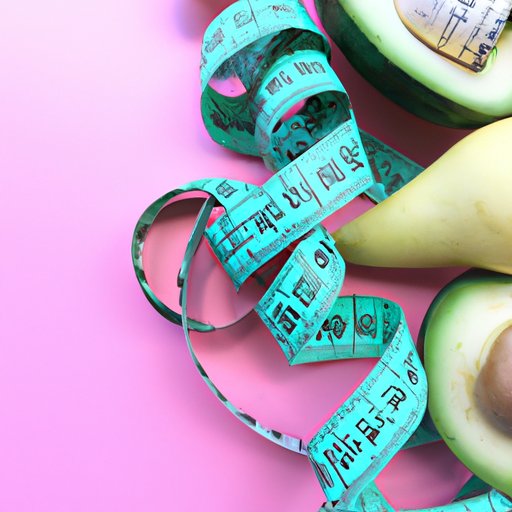
Introduction
Carbohydrates, or carbs, are an essential macronutrient that provide energy to fuel our bodies. They are found in foods such as grains, fruits, and vegetables. With the abundance of diets claiming to be the key to weight loss, it can be difficult to determine the right amount of carbs to consume each day. In this article, we will explore how many carbs a day for weight loss, the benefits of a low carb diet, and the best low-carb foods for weight loss. We will also discuss the relationship between carbs and calories, macro-nutrient ratios, and the importance of exercise in finding the right balance.
Carbs and Calories: Finding the Right Balance for Weight Loss
When it comes to weight loss, the number of calories you consume is essential to consider. Consuming fewer calories than you burn is the key to losing weight. However, carbs play an important role in providing energy to fuel exercise and everyday activities, so it’s important not to cut them out entirely.
The amount of carbs you need depends on a variety of factors, including your age, gender, weight, and goals. The recommended daily intake of carbs is typically 45-60% of total caloric intake. For someone consuming 2000 calories per day, that equates to 225-325 grams of carbs.
It’s important to balance carb intake with other macronutrients, such as protein and fat. For example, a balanced meal may include a serving of protein, a small amount of healthy fat, and complex carbohydrates such as vegetables and whole grains.
Benefits of a Low Carb Diet for Weight Loss
Reducing carbohydrates can be beneficial for weight loss for several reasons. Firstly, low carb diets have been shown to improve blood sugar control, which can lead to weight loss. Additionally, consuming fewer carbs can lead to decreased cravings for sugary and processed foods. Low carb diets have also been shown to be effective for weight loss in studies.
High Carb Vs Low Carb Diets: Which is Better for Weight Loss?
There is no one-size-fits-all approach to weight loss, as everyone’s bodies are different. Both high carb and low carb diets can be effective for weight loss when done properly.
High carb diets typically consist of 60% or more of total daily caloric intake, and may include foods such as bread, pasta, and rice. In contrast, low carb diets typically involve reducing daily carb intake to less than 100 grams per day. The ketogenic diet, which involves consuming very few carbs and high amounts of fat, has also gained popularity as a weight loss approach.
When considering the health implications of each approach, it’s important to note that high carb diets have been linked to certain health conditions, such as type 2 diabetes and cardiovascular disease. Low carb diets, on the other hand, can be challenging to stick to and may lead to nutrient deficiencies if done improperly. The low glycemic index diet, which focuses on consuming carbohydrates that are slower to digest, may be a good middle ground approach.
Carbs and Macro-Nutrient Ratios for Successful Weight Loss
The concept of macro-nutrient ratios involves balancing the intake of carbs, protein, and fat for optimal weight loss. One popular approach is the 40/30/30 approach, which involves consuming 40% of total daily calories from carbs, 30% from protein, and 30% from fat.
When determining the right amount of carbs for weight loss based on macro-nutrient ratios, it can be helpful to consult with a registered dietitian. They can provide personalized recommendations and help prevent nutrient deficiencies.
The Best Low-Carb Foods for Weight Loss
When focusing on low-carb foods for weight loss, it’s important to aim for variety and balance. Some examples of nutrient-dense, low-carb foods include:
- Leafy greens such as spinach and kale
- Cruciferous vegetables such as broccoli and cauliflower
- Berries such as strawberries and blueberries
- Healthy fats such as avocado and nuts
- Lean protein such as chicken, fish, and tofu
Carbs and Exercise: Maximizing Weight Loss with the Right Fuel
Carbohydrates and exercise go hand in hand, as consuming carbs can provide the energy needed to fuel workouts and optimize performance. It’s important to consume a balance of carbs, protein, and fat before and after exercise to ensure optimal fueling and recovery.
For workouts less than 60 minutes, consuming a small snack such as a banana or piece of toast can provide the carb fuel needed. For longer workouts, consuming a balanced meal 2-3 hours prior can provide sustained energy. After workouts, consuming a combination of carbs and protein within 30 minutes can help with recovery and muscle repair.
Conclusion
Finding the right balance of carbs for weight loss is important to consider alongside other factors such as calorie intake, macro-nutrient ratios, and exercise. Low carb diets can offer benefits for weight loss, but it’s important to balance carb intake with other nutrient-dense foods and macronutrients. Consulting with a registered dietitian can provide personalized recommendations and help prevent nutrient deficiencies.





